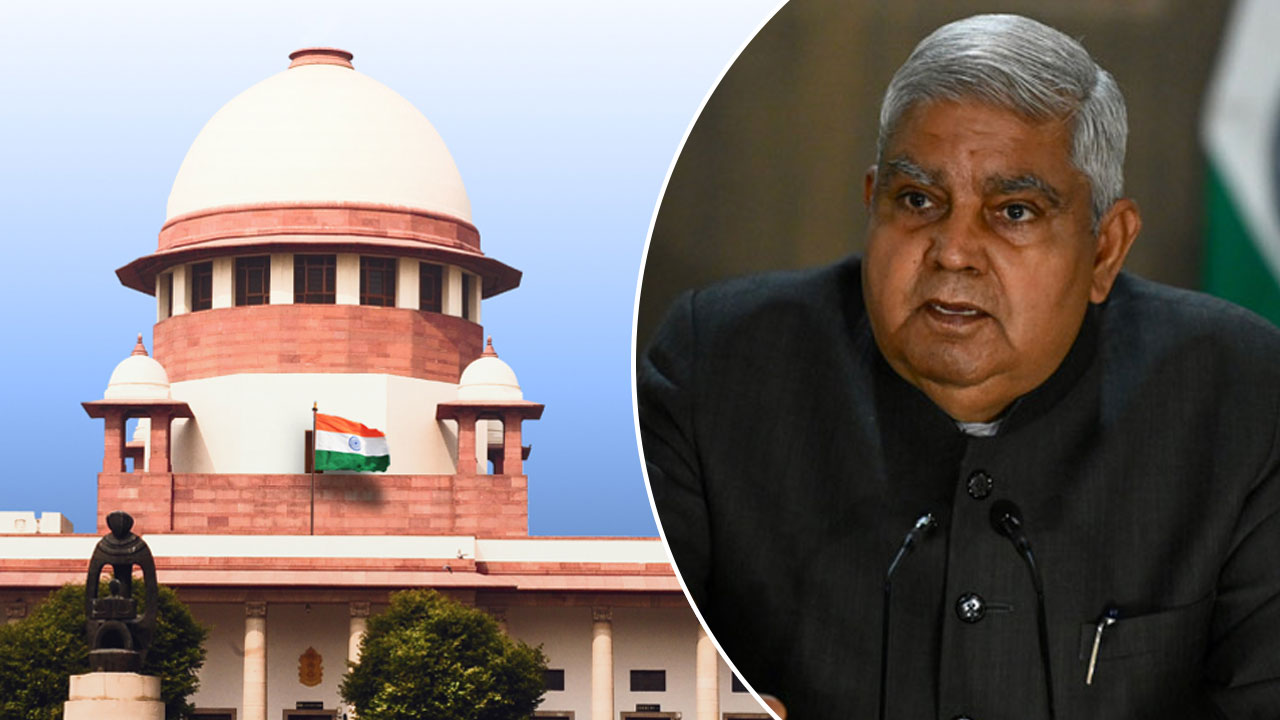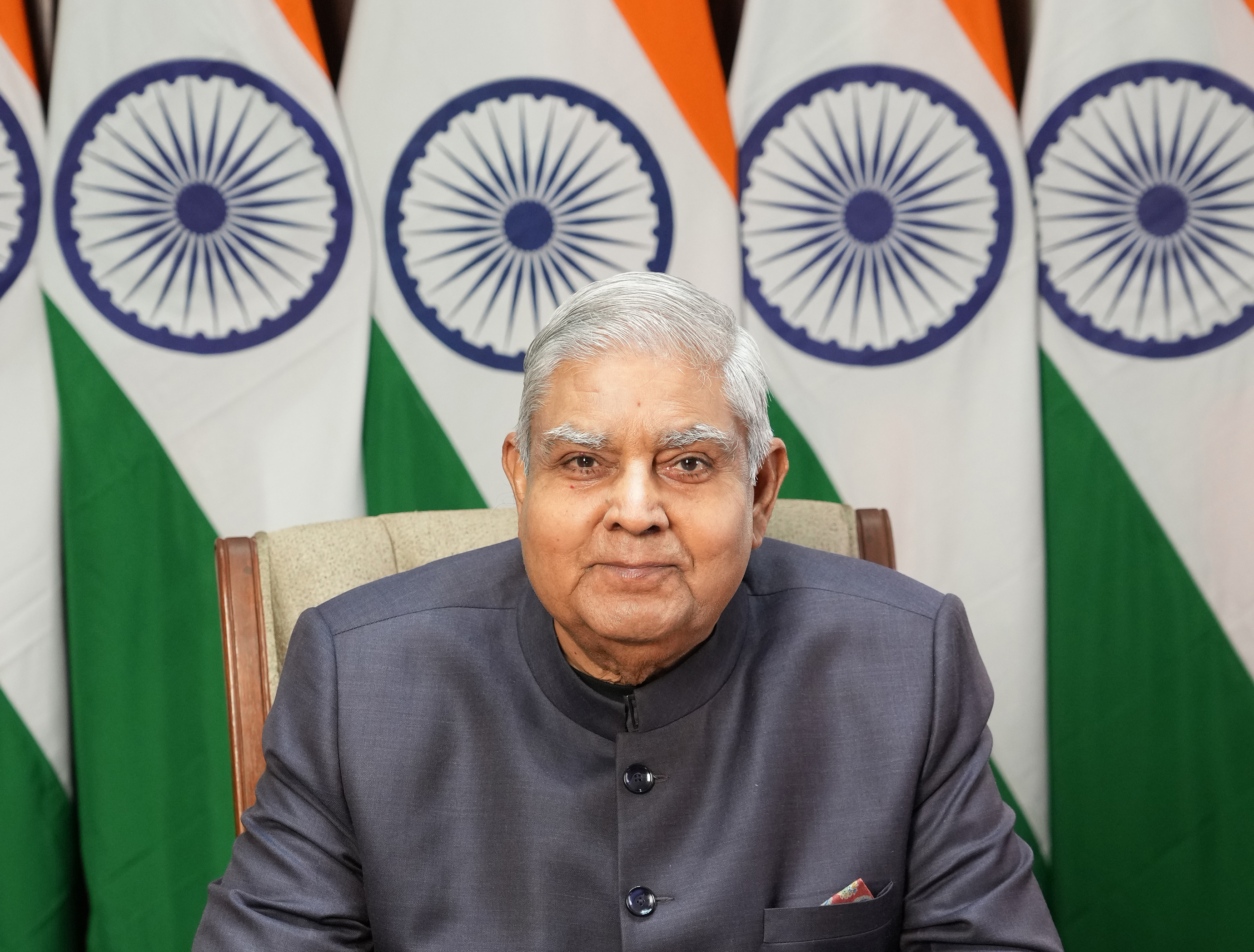In a powerful and unprecedented critique of the Indian judiciary, Vice President Jagdeep Dhankhar on April 17, 2025, issued a sharp rebuke of the Supreme Court’s recent actions, accusing it of overstepping its constitutional mandate and acting as a “super Parliament.” Speaking at the valedictory function of the 6th Rajya Sabha Internship Programme in New Delhi, Dhankhar raised serious concerns about the Supreme Court’s use of Article 142 — which grants it plenary powers to ensure “complete justice” — describing it as a “nuclear missile” wielded 24×7 by the judiciary against democratic institutions. This strong statement has ignited a nationwide debate on the separation of powers, judicial accountability, and the delicate balance between the legislature, executive, and judiciary in India’s democracy.
Dhankhar’s remarks come in the wake of the Supreme Court’s April 8, 2025, ruling that directed the President of India to act within a three-month timeline on bills reserved by state governors, effectively setting deadlines for presidential assent. The Vice President questioned the constitutional validity of such directives, emphasizing that the judiciary cannot direct the President, who is a constitutional authority with distinct powers. He warned that the judiciary’s increasing encroachment into legislative and executive domains threatens to destabilize India’s constitutional framework and undermine the principle of separation of powers, which is foundational to the country’s democratic governance.

Vice President Dhankhar Flags Supreme Court Overreach: Judiciary or ‘Super Parliament’?
Vice President Dhankhar’s sharp critique focused on the Supreme Court’s recent judgment in the State of Tamil Nadu vs Governor case, where the court directed the President to decide on bills within a stipulated timeframe. Dhankhar argued that this move effectively transforms the judiciary into a “super Parliament,” performing legislative and executive functions without accountability. He underscored that under the Indian Constitution, only a bench of five or more judges under Article 145(3) has the authority to interpret the law on substantial constitutional questions, and even then, the judiciary cannot direct the President’s actions.
Calling Article 142 a “nuclear missile” in the judiciary’s arsenal, Dhankhar warned that its unrestrained use threatens democratic forces. Article 142 allows the Supreme Court to pass any decree or order necessary to do “complete justice” in cases before it, but Dhankhar cautioned that its frequent invocation to direct constitutional authorities risks upsetting the balance of power. He stressed that the legislature, judiciary, and executive must “blossom” within their own domains to maintain the equilibrium essential for a stable democracy.
Concerns Over Judicial Accountability and Immunity: The Justice Varma Cash Controversy
Dhankhar also raised concerns over the handling of the Justice Yashwant Varma case, where semi-burnt sacks of cash were reportedly found at the judge’s official residence in Delhi. Highlighting the delay in public disclosure and investigation, he questioned the absence of a First Information Report (FIR) and the special permissions required to initiate proceedings against judges. Dhankhar pointed out that unlike other constitutional functionaries, judges enjoy a form of immunity not explicitly provided for in the Constitution, which only grants such protection to the President and Governors.
He warned that this “category beyond law” undermines the rule of law and public trust in the judiciary. Dhankhar emphasized that no one should be above the law and that transparency and accountability must prevail regardless of an individual’s position. This perspective has gained traction in recent years, especially as the judiciary itself has taken steps toward greater openness—most notably, the Supreme Court’s recent decision to require public declaration of judges’ assets.
This move, aligned with the ethical principles set out in the 1997 Restatement of Values of Judicial Life, is seen as a significant stride toward reinforcing public confidence and ensuring that judges adhere to the highest standards of integrity and impartiality. The broader reform agenda now includes not only asset disclosure, but also digitization of court processes, establishment of fast-track courts, and efforts to make legal proceedings more accessible and efficient, all aimed at reinforcing the judiciary’s credibility and effectiveness.
The Vice President’s call for a structured discussion on judicial accountability with parliamentary leaders reflects a growing consensus that judicial independence must be balanced with robust mechanisms for oversight and transparency. Recent debates about the lack of external accountability in judicial appointments and the handling of misconduct allegations have reignited interest in reforms such as the revival of the National Judicial Appointments Commission (NJAC), the creation of independent judicial oversight bodies, and the formalization of enforceable codes of conduct for judges.
These measures are viewed as essential to restoring public trust and ensuring that the judiciary remains answerable to the people it serves. Ultimately, the goal is to create a system where the judiciary can maintain its independence while also being subject to meaningful scrutiny, thereby upholding both the rule of law and the democratic values at the heart of India’s constitutional framework.

The Separation of Powers Under Threat: Dhankhar’s Call for Institutional Balance
At the heart of Dhankhar’s critique is the erosion of the separation of powers, a cornerstone of India’s constitutional democracy. He warned that when one institution—be it the judiciary, legislature, or executive—encroaches on the domain of another, it risks destabilizing the entire system. Dhankhar stressed that the legislature, judiciary, and executive must operate strictly within their constitutional boundaries to maintain the “balance” that ensures good governance and democratic stability.
Vice President Dhankhar’s caution against judges who legislate, execute, and remain unaccountable directly addresses the phenomenon of judicial overreach, a situation where the judiciary exceeds its constitutional mandate and encroaches upon the domains of the legislature and executive. Judicial overreach in India occurs when courts not only interpret the law but also begin to make laws or direct executive actions, thereby disturbing the balance of powers fundamental to a functioning democracy. While the judiciary plays a vital role in upholding constitutional values and protecting fundamental rights, excessive intervention in policy-making or administrative matters can undermine parliamentary sovereignty, erode democratic decision-making, and create institutional tensions.
To prevent such overreach, there is an urgent need for a clearer demarcation of institutional roles and robust mechanisms that reinforce the separation of powers. The Indian Constitution provides for a system of checks and balances, wherein the legislature makes laws, the executive implements them, and the judiciary interprets and reviews their constitutionality.
Maintaining this balance is crucial for accountability, transparency, and the rule of law. Experts recommend that the judiciary adhere strictly to its interpretive role, avoid encroaching on legislative or executive functions, and exercise judicial restraint, especially in matters of public policy and governance. Additionally, greater judicial accountability and clear guidelines for interventions such as Public Interest Litigations (PILs) can help ensure that the courts act within their constitutional limits, preventing any one branch from becoming too powerful or unaccountable.

The Road Ahead: Judicial Reforms and Strengthening Democracy
Vice President Dhankhar’s statements have reignited a crucial national conversation on the role of the judiciary and the need for institutional reforms. His call for amending Article 145(3) to clarify judicial powers and for regulating the use of Article 142 reflects a broader demand for checks and balances within the judiciary itself. Experts and policymakers are now debating how to preserve judicial independence while ensuring accountability and preventing overreach.
The controversy over judicial overreach and recent allegations of misconduct have underscored the urgent need for transparent, robust mechanisms to investigate complaints against judges—without undermining the independence that is central to the judiciary’s role in a democracy. Currently, India’s system relies on a combination of constitutional safeguards and internal procedures, such as the in-house inquiry mechanism and the impeachment process. However, as recent high-profile cases like that of Justice Yashwant Verma have shown, these mechanisms are often criticized for their lack of transparency and effectiveness.
The in-house procedure, while designed to protect judicial independence, operates largely behind closed doors, with outcomes rarely disclosed to the public. Impeachment, meanwhile, is a politically fraught and cumbersome process that has never resulted in the removal of a sitting judge in India’s history, as it requires a two-thirds majority in both houses of Parliament and is vulnerable to political maneuvering or resignation by the judge before completion. Experts argue that while judicial immunity is essential to prevent undue influence, it should not become a shield against accountability, and reforms are needed to strike the right balance.
Strengthening India’s democratic institutions thus requires more than just respecting the separation of powers—it demands active cooperation, transparency, and mutual respect among the branches of government. Vice President Dhankhar’s warnings highlight that democracy thrives when each institution functions within its constitutional limits, upholds the rule of law, and remains answerable to the people.
This means not only reforming judicial accountability mechanisms, such as making asset disclosures mandatory and revisiting the process for investigating judges, but also fostering a culture of dialogue and collaboration between the judiciary, legislature, and executive. India’s experience demonstrates that effective democratic governance is built on checks and balances, continual institutional introspection, and a willingness to adapt. Only by embracing these principles can the country ensure that its democracy remains resilient, credible, and truly representative of the people’s will.
Conclusion: A Defining Moment for India’s Democracy
Vice President Jagdeep Dhankhar’s unprecedented critique of the Supreme Court’s recent actions marks a defining moment in India’s democratic discourse. His concerns about judicial overreach, lack of accountability, and erosion of the separation of powers strike at the core of constitutional governance. As India navigates this complex debate, the nation must strive to uphold the delicate balance between judicial independence and democratic accountability.
The coming months will be critical as lawmakers, jurists, and civil society engage in discussions on judicial reforms and the future of India’s constitutional democracy. Dhankhar’s call to action emphasizes that the strength of India’s democracy lies in the harmonious functioning of its institutions, each respecting the boundaries set by the Constitution. Only then can India ensure justice, fairness, and stability for generations to come.
Follow: Supreme Court of India
Also Read: BJP Search For UP Chief: Bold Move To Appoint an OBC Ahead of 2027 Elections

